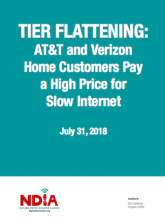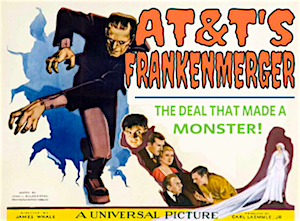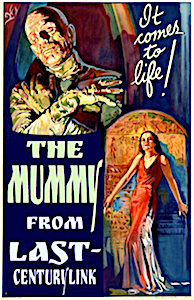
Fast, affordable Internet access for all.

Consumer Reports (CR) has once again gone straight to the source to collect opinions on subscribers’ experiences with their Internet access, telephone, and pay TV services. Unsurprisingly, a vast majority of respondents to their survey of 176,000 people expressed dissatisfaction with the large national providers. Once again, municipal network Chattanooga EPB Fiber walked away as the only Internet service provider to receive top marks for value, speed, and reliability.
This isn’t the first time the Tennessee publicly owned network appeared at or near the top of the list in a customer satisfaction survey. In addition to consistent high scores on CR surveys, EPB Fiber has also earned kudos from J. D. Power.
After Chattanooga EPB Fiber, Google Fiber was the only private sector ISP to garner a positive rating from subscribers. Google Fiber also obtained a favorable score for value.
Bigger is Better (Not!)
The most recent survey from CR also underscored what many Internet access, pay TV, and telephone subscribers keep expressing year after year — that they despise the big, corporate behemoth providers. When it comes to Internet access, smaller cable ISPs fared a little better, but only Armstrong Cable Company, serving communities in Pennsylvania, Ohio, and four other states, received an “overall satisfaction” rating.
RCN, Hawaiian Telecom, and Grande Communications also did better than the large ISPs, including Comcast, Spectrum, and Cox Communications.
Hiding Fees in the Bundles
According to a CR article on their survey and analysis of the results, approximately 75 percent of subscribers answering the survey needed to bundle TV, Internet access, and telephone to obtain what they thought was the best deal. Subscribers reported that, even though they had to continually haggle for acceptable pricing, they still felt overcharged.

In recent years AT&T and Verizon, the nation’s two largest telco Internet providers, have eliminated their cheaper rate tiers for low and mid-speed Internet access, except at the very slowest levels. Each company now charges essentially identical monthly prices – $63-$65 a month after first year discounts have ended – for home wireline broadband connections at almost any speed up to 100/100 Mbps fiber service.
This policy of upward “tier flattening” raises the cost of Internet access for urban and rural AT&T and Verizon customers who only have access to the oldest, slowest legacy infrastructure.
Affordability is the greatest barrier to increased home broadband subscriptions. In the United States, broadband is becoming faster for some households and more expensive for others.
This report from the National Digital Inclusion Alliance (NDIA) takes a detailed look at tier flattening from AT&T and Verizon, digging into monthly rates that users pay and the types of services they obtain from each company. The authors put the numbers side by side and show that those purchasing what used to be the most economical Internet access service are now simply paying higher rates for slow service.
Download the report to see the comparisons and the authors' analysis.
Now that they have removed the weight of Colorado’s restrictive SB 152, Greeley is looking forward to future solutions to poor Internet access. In a recent letter to the local Tribune, resident Richard Reilly offered three reasons why Greeley should develop a plan to move toward municipal broadband.
Reilly’s points are:
First and foremost, net neutrality must be at the heart of a municipal broadband. As the big Internet Service Providers start to throttle specific websites that compete or offer tiered packages, Greeley must commit itself to net neutrality. One price for full Internet access. Period.
Secondly, speed needs to be a priority. Comcast and the other ISPs have received billions of dollars to build the infrastructure for gigabit speeds. If Greeley can commit to the infrastructure to offer gigabit speeds, other ISPs will struggle to survive in our city — and good riddance.
Thirdly, customer service is key.
Already On Track
Reilly’s suggestion follows the community’s decision last summer to fund a feasibility study. At the time, they expressed a hope that the study might encourage incumbents to offer better rates and services. In addition to better connectivity for the general public, Greeley’s Family and Recreation Center’s poor Internet access interfered with bookings. When the City Council decided to fund the study, they cited economic development as a key factor in finding ways to improve local connectivity.
Local Commitment
Since the City Council’s decision to fund the feasibility study, the FCC has repealed network neutrality protections and is considering lowering the speed definitions of broadband. Reilly writes that Greeley needs to engage in local action:
Greeley is in a unique position to protect its residents from a rogue administration. Despite the fact that a vast majority of Republicans, Democrats and independents support net neutrality rules, the FCC rolled back the regulations meant to protect the freedom to information in this country.
In the midst of price increase announcements from Comcast and others for 2018, gigabit subscribers in Longmont, Colorado, are enjoying a price decrease from their publicly owned network, NextLight.
Happy New Year
As of January 1st, standard residential gigabit Internet access rates dropped from $99.95 per month to $69.95 per month. According to Longmont Power and Communications (LPC), about 28 existing subscribers obtained gigabit speeds at the old rate; along with any new gigabit subscribers, the existing customers will receive the new rate.
In addition to this most recent price reduction, NextLight offers a loyalty bonus for subscribers who obtain service for 12 continuous months. Gigabit subscribers who qualify have rates reduced to $59.95 per month. Charter Members — residents who subscribe for services within three months that service is available within their area — are able to receive gigabit connectivity for $49.95 per month as long as they keep their services. Charter Member rates stay with the premise if they sell their home and take that rate with them to their new residence. NextLight subscribers can also sign up for 25 Mbps service for $39.95 per month.
All speeds are symmetrical so subscribers can take advantage of the robust upload speeds. Subscribers are better positioned to work from home and establish at-home businesses. With symmetrical connectivity, Longmont’s school children can take full advantage of web based home work programs and adults who want to pursue distance learning don’t have the hurdle of poor Internet access to handicap their goals.
Part Of The Success
In addition to affordable rates, NextLight offers promotions to increase sign-ups. Subscribers who successfully refer others will get one month of free service for each new subscriber. NextLight is extending the promotion to its Digital Voice service during the first three months in 2018.
"We're customer-based and customer-focused," Longmont Power and Communications General Manager Tom Roiniotis said in a statement.
It’s been almost two years since 82 percent of Loveland voters chose to opt out of Colorado’s restrictive SB 152. Last fall, the community started working with a consultant on a feasibility study and now, residents and businesses are being asked to complete a second survey to gauge interest in the potential for connectivity offered by the city.
One Step At A Time
Loveland, a community of about 69,000 people in the southeast corner of the state, completed a survey last year, which revealed that 56 percent of residents and 37 percent of businesses feel incumbents are not meeting their connectivity needs. Affordability is a big factor for both sectors with lack of capacity and reliability following close behind. Residents reported they were also unhappy with customer service. Within both sets of respondents, a high percentage showed interest in obtaining service directly from the city or from a private provider working with the city.
This summer, the city released an RFP, hoping to elicit interest from the private sector for potential partners to help them develop a municipal fiber network. Read the full text of the RFP here.
Many premises in Loveland subscribe to cable from Comcast, which faces little or no competition from services other than DSL at much slower speeds. Resident Roger Ison wrote to the Reporter Herald recently encouraging residents and business owners to participate in the survey:
Comcast reaches enough Lovelanders to set the market price for high-speed service here. Competition and citywide access are inadequate because no other competitor has deployed a modern, high-performance network that reaches most potential subscribers.
In addition to studying how and where local communities examine the potential for publicly owned Internet networks, we’ve looked at rates over time in select areas of the country. We recently put together a comparison of historical rates for municipal networks in Tennessee. Our findings are consistent with what we’ve seen all over the country - publicly owned networks don't hesitate to raise speeds while keeping rates affordable. We've documented the data on our fact sheet: Municipal Networks: Speed Increases & Affordable Prices.
Not Like The Big Guys
National providers make it a habit to periodically raise rates and over time those increases add up. They’ve done it so often, subscribers have come to expect it on a regular basis. Price increases don’t usually include a speed increase. With no need to appease shareholders, officials in charge of publicly owned networks can set rates at a level that allow a network to be sustainable rather than rates that maximize profits.
Publicly owned networks have increased speeds for subscribers, often with little or no fanfare other than quietly alerting subscribers to their improved service. Places Chattanooga’s EPB, Morristown’s FiberNET, and BET in Bristol are in a much different habit than Comcast or AT&T - they increase speeds with no increase in price. Other Tennessee communities have increased speeds significantly with only slight price increases over years of service.
Speeds, Rates Then And Now
On our fact sheet, we include prices for the basic tiers now and when the network began offering services. We also compare the basic speeds when the network began serving the community and today. The results reflect how publicly owned networks focus on providing fast, affordable connectivity to subscribers rather than collecting profit from customers.
Some results may surprise you:
The imminent arrival of Google Fiber and two other Internet Service Providers offering Gigabit speeds (1,000 Megabits per second) to Huntsville, Alabama is expected to be a boon to subscribers, reports Alabama Tech.
The tech publication predicts the three ISPs - Google Fiber, AT&T and WOW! - will spur competition that will lower prices for residential and business subscribers. A newly-released report from Analysis Group and funded by the Fiber to the Home Council shows that direct competition in a designated market results in overall price drops for connectivity service of all speeds.
“Research shows a 'Gig City' lowers the monthly standard price on plans with at least 100 Mbps down 25 percent, or $27 per month. When it directly compares markets with one Gigabit provider compared to two, the price of Gigabit services decreases approximately 34 to 37 percent, or $57 to $62 per month.”
The tech publication also stated a domino effect occurs when an ISP says it will offer Gigabit services:
“The likelihood of other providers offering similar services increases in an effort to keep pace with its competition. This trend applies to Huntsville. WOW! and AT&T announced it had launched Gigabit-speed services for Huntsville customers in October 2016, which was less than a year after Google Fiber announced it would offer services to some Huntsville customers beginning in 2017.
From Alabama Tech:
“When Google Fiber enters the market, it will likely help lower prices in Huntsville...WOW! will likely offer gigabit speeds at $160 per month for customers after the conclusion of its $70 per month promotion, while AT&T Fiber is currently offering Huntsville customers a non-promotional rate of $90 per month for gigabit services. Google Fiber is expected to offer $70 per month services when it enters the market. AT&T Alabama president Fred McCallum wouldn't rule out price adjustments to compete with other providers.”
Much like the the bone-chilling flicks celebrating eerie entertainment that dwells in the depths of our dark imaginations, monster cable and DSL Internet service providers strike terror in the hearts of subscribers…if they survive. Mesmerizing fees, hair-raising customer service, and shockingly slow connections can drive one to the brink of madness.
In celebration of Halloween 2016, our writers each selected a national ISP and reimagined it as a classic horror character. The results are horrifying! Read them here…if you dare!
AT&T’s Frankenmerger

by Kate
This shocking film tells the horrific tale of a mad scientist in his quest to create the world’s largest telecommunications monopoly monster. The scientist’s abomination runs amok, gobbling up company after company, to create a horrifying monster conglomerate. Watch the monster terrorize towns across America as it imposes data caps, denies people access to low-cost programs, and refuses to upgrade infrastructure. What nightmare lies ahead? Will the townsfolk and their elected officials unite to stop the monster, before it acquires Time Warner? Watch and find out!

The Mummy From Last CenturyLink
by Scott
On July 4th, Sandy, Oregon’s municipal fiber-optic network, SandyNet, permanently increased the speed of its entry-level Internet package from 100 Megabits per second (Mbps) to 300 Mbps at no additional cost to subscribers.
The city announced the speed boost for its $39.95 per month tier in a recent press release, calling it “one of the best deals in the nation.” SandyNet customers witness blazing fast download speeds at affordable prices and benefit from symmetrical upload speeds, allowing them to seamlessly interact with the cloud and work from home.
Sandy is still home the “$60 Gig” (see price chart), one of the premier gigabit Internet offers in the nation. Without an electric utility, SandyNet’s unique model can be applied to “Anytown, USA.”
Read our report on Sandy, SandyNet Goes Gig: A Model for Anytown, USA, for details on the community's Fiber-to-the Home (FTTH) and fixed wireless networks and listen to Chris interview Sandy officials in Community Broadband Bits Podcast Episode 167.
Check out our video on Sandy:
A recent large-scale cross-national study from the Organisation for Economic Co-operation and Development (OECD) offers strong evidence that municipal broadband networks provide numerous benefits for communities around the world. Among the study’s major findings include evidence that municipal networks contribute to efforts aimed at improving local economic development, stimulating business productivity and innovation, and enhancing people’s quality of life.
The study's analysis of European nations is of special interest to us as European municipal networks are the only international municipal networks in the study that closely resemble U.S. municipal networks. In particular, the findings from the study’s central econometric analysis of Swedish municipal networks have direct implications for our understanding of the impact of municipal networks in the United States.
Findings from Econometric Analysis of Sweden
As the researchers note, extensive municipal broadband development across Sweden has contributed to a remarkably high level of nationwide fiber penetration, putting the country far ahead of the US in global rankings. The researchers report a series of features and benefits of Sweden’s widespread fiber penetration and aggressive municipal broadband efforts, including:
Increased rates of employment (with even greater employment increases in highly urbanized municipalities), increased business creation, and reduced car usage (also greater in the most urban cities) as fiber networks make it easier to telecommute to work and to shop for goods and services online.